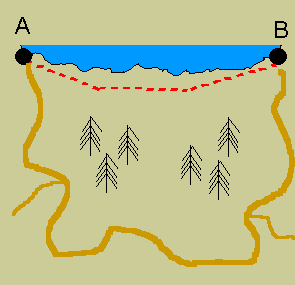N Is a Number
Problem
A group of N people holidaying in the seaside town A decided to visit their friends staying town B which is N km (kilometres) along the coast.
Some of the group walk along the cliff path at a steady N km an hour. The rest, one less in number than the walkers, go by car which (not counting stops) averages $10$ times the speed of the walkers.
The road is much longer than the cliff path.

Those in the car stop for N minutes for fuel, then N times as long as that for coffee, and are further delayed for N minutes by a flock of sheep. They finally reach town B one minute before the walkers.
How long is the road between towns A and B ?
Getting Started
Is N odd or even?
How long do the walkers take to reach B?
How large can N be?
Student Solutions
We had many correct answers to this problem, including some well argued solutions from Thomas Wong (Reed High School, Sparks, Nevada, USA) and Stelios Serghiou (G.C.School of Careers).
Peter Simpson from Castell Alun School argued as follows:
If N was 7 (or greater) the time delays would be greater than 59 minutes, the time for the car to travel to B (the walkers arrive in 60 minutes - N miles in an hour, the car arrives 1 minute earlier).
If N was 3 the distance would be 22km, but this would mean the holiday makers would split into 2 walkers and 1 car traveller, and as the problem states "they" for the car travellers the number of people in the car must be greater than 1.Therefore N is 5, and the distance by road is 20km.
Momtchil Iliev from Drayton Manor School argued in a very similar way and added an explanation for how he calculated the distance by road:
Calculating Distance of road travelled by carTime taken driving = 59 - (5) ² - 2(5)
= 59 - 25 - 10 = 24 minutes = 0.4 hours
Speed of travelling by car = 10N = 10(5) = 50 km/h
Distance of road = Speed of car x time taken travelling
= 50 x 0.4 = 20km
Harry also sent in his work on this problem:
Because each group has at least 2 people in it, and there is one more walker than person in the car, there must be at least 5 people, so $N\geq 5$.
The walkers walk $N$ km at $N$ km/hr, so take 1 hour, which is 60 minutes.
The people in the car drive $d$ km at $10N km/hr$, which takes $\frac{60d}{10N}$ minutes, and stop for $N+N^2+N$ minutes. This takes 60-1=59 minutes. So $\frac{60d}{10N}+N+N^2+N=59$, so $\frac{6d}{N}+2N+N^2=59$, so $d=\frac{59N-2N^2 -N^3}{6}$. If $N=6$, this gives 11/6, which is less than $N$, so that's not allowed, and since it's just going to get smaller and smaller, we must have $N< 6$. But $N\geq 5$, so $N=5$. So $d=20km$.
Well done to you all
